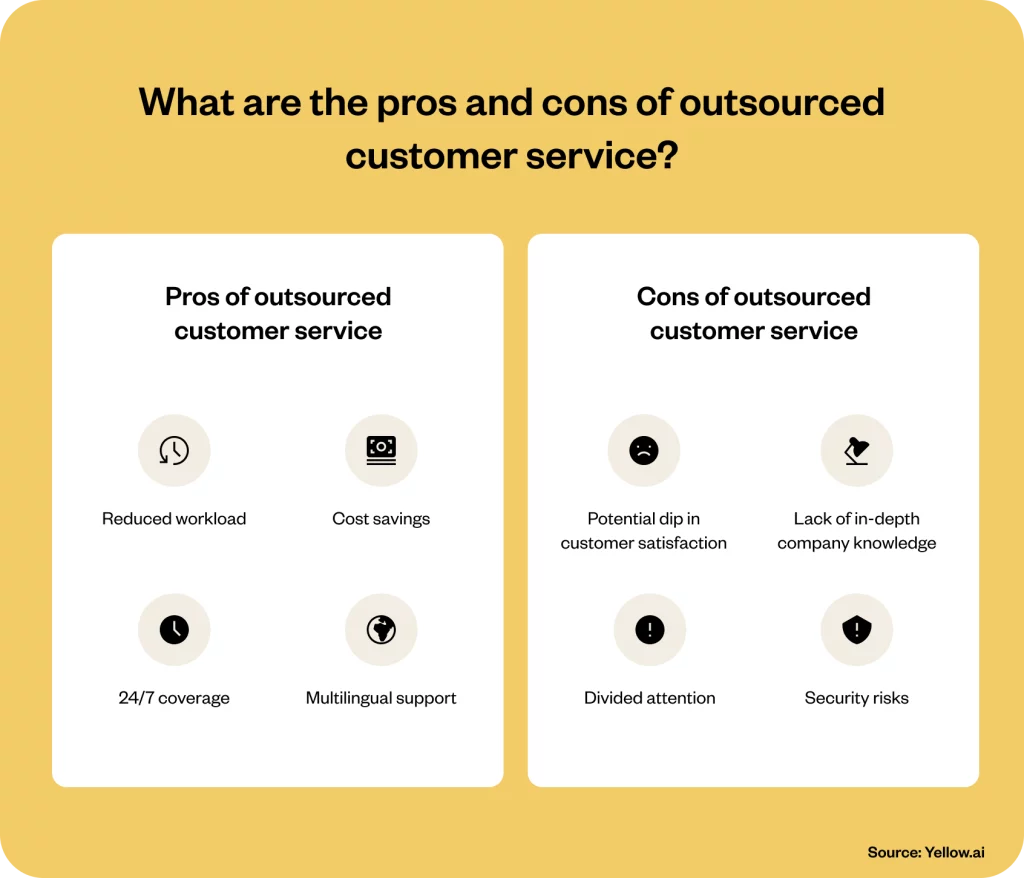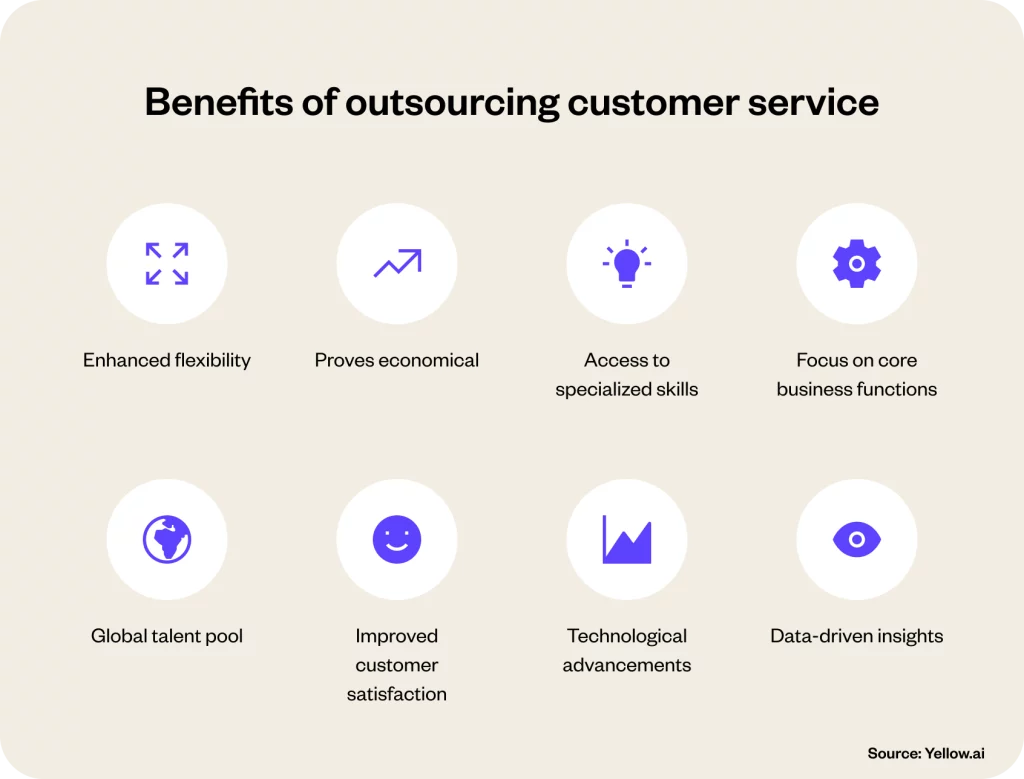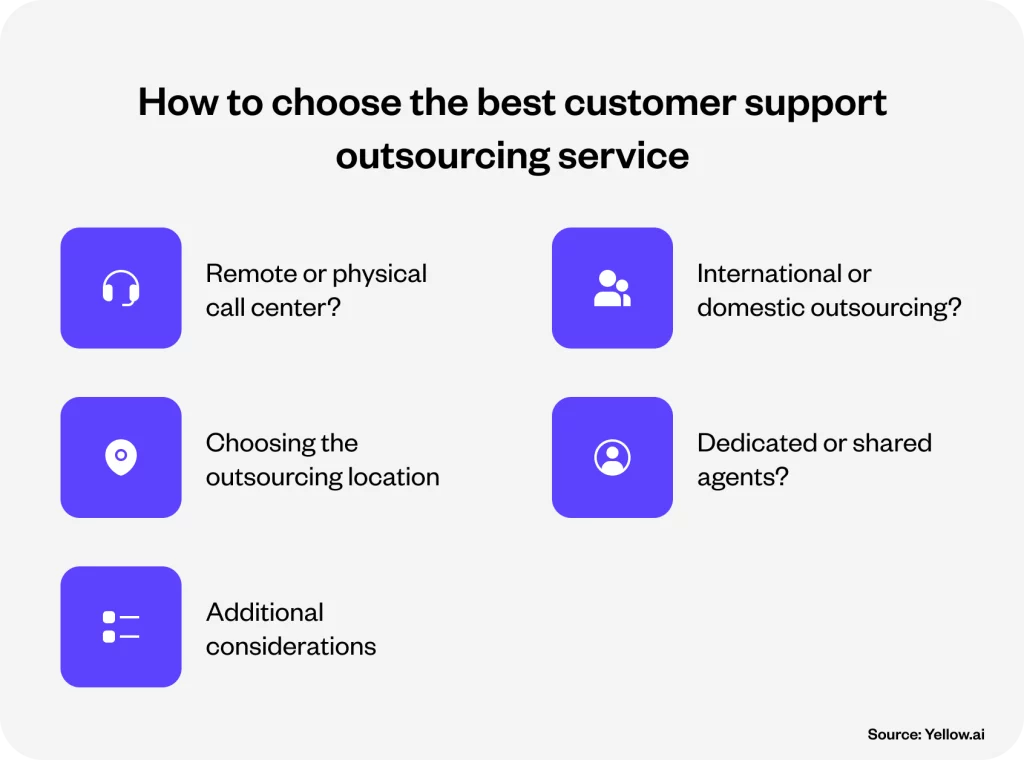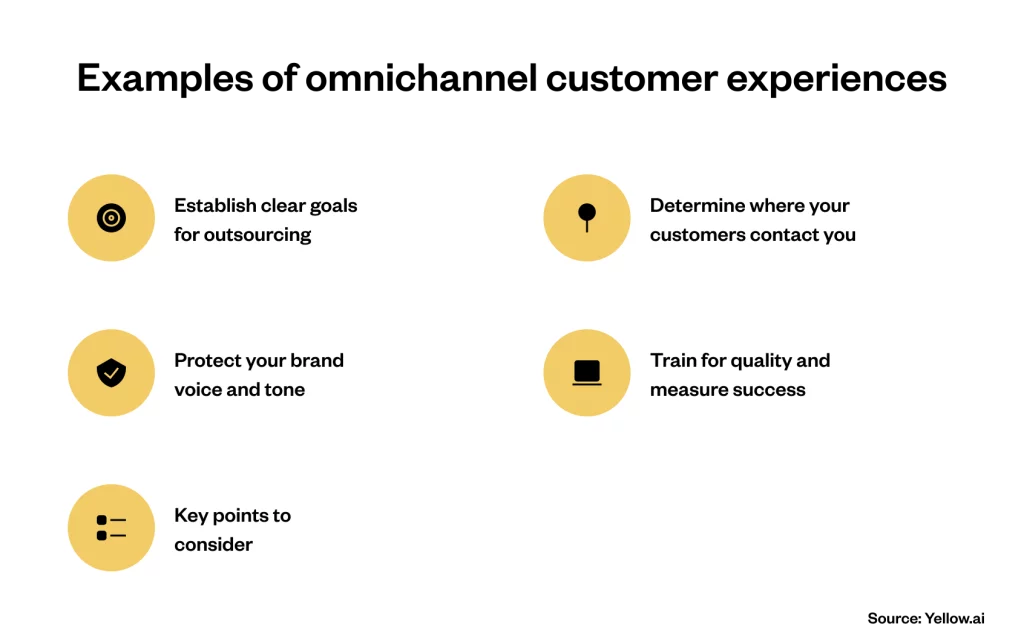Executive summary
The customer service domain is undergoing a massive shift with the arrival of outsourcing. This blog aims to comprehensively explore customer service outsourcing, revealing its multifaceted nature and significant role in contemporary business strategies. We will study what customer service outsourcing is, the numerous benefits of outsourcing customer service, and the critical factors to consider when outsourcing customer service. This blog can be a holistic guide for businesses navigating the outsourcing realm.
Introduction
Gone are the days when customer service was a mere afterthought, confined to the back offices of businesses. Today, it’s a dynamic battlefield where companies vie to outdo each other in delivering exceptional experiences. In this quest, customer service outsourcing has emerged as a game-changer, offering a pragmatic solution to the ever-increasing demands of a digitally-empowered customer base.
Imagine your business harnessing the global talent pool, breaking free from the constraints of traditional operation models, and offering your customers round-the-clock service. That’s the transformative power of customer service outsourcing.
Whether it’s an agile startup or a seasoned enterprise, the decision to outsource is driven by the desire to keep up and lead in the race for customer satisfaction. This blog will take you through the nuances of customer support outsourcing service, unfolding the layers that make it a compelling choice for businesses striving to thrive in today’s fast-paced, customer-centric world.
Related must-reads:
- How to improve customer service?
- How to automate customer support effectively?
- What is customer service automation [+7 benefits]
- Customer experience vs customer service: More than just semantics
What is outsourced customer service?
At its core, outsourced customer service is about entrusting your customer support operations to external specialists. It’s a strategic move where a business engages a third-party service provider to manage and handle its customer service interactions. These providers often have a team of seasoned agents trained to address customer inquiries and issues across various communication channels, including phone, email, live chat, social media, and SMS.
The concept has evolved far beyond traditional call centers. Today, outsourced customer service is multifaceted, embracing omnichannel strategies that ensure a cohesive customer experience regardless of the platform. This approach allows businesses to stay connected with their customers across all touchpoints, offering consistent and personalized support.
Business process outsourcing (BPO) lies at the heart of outsourced customer service. BPOs are organizations specializing in taking over specific business functions, like customer service, and running them effectively and efficiently. They often employ a blend of technology, process management, and human expertise to deliver services that align with the client company’s standards and expectations.
What are the pros and cons of outsourced customer service?
Outsourced customer service, a strategy increasingly adopted by businesses, comes with its advantages and challenges. By understanding these factors, enterprises can make informed decisions aligning with their goals and customer service standards.

Pros of outsourced customer service
Reduced workload: Outsourcing customer service can be a significant relief for small businesses where resources are often stretched thin. It enables business owners and employees to concentrate on core tasks such as sales and product development rather than being tied up with customer inquiries.
Cost savings: Outsourcing can be more pocket-friendly than having an in-house team. It eliminates the need for fixed salaries, benefits, and the expenses associated with setting up a workspace – computers, software, office furniture, and other equipment.
24/7 coverage: Today’s consumers expect round-the-clock service. Outsourced customer service can provide this continuous support, ensuring customer queries are addressed promptly, even during off-hours or holidays.
Multilingual support: In our global economy, serving a diverse customer base is crucial. Outsourcing gives access to agents who can interact in multiple languages, bridging communication gaps and enhancing customer satisfaction.
Cons of outsourced customer service
Potential dip in customer satisfaction: One concern with outsourcing is the possibility of diminished customer satisfaction. It can be due to various factors, including cultural mismatches and less personalized service. To mitigate this, choosing a provider with a strong track record and a commitment to maintaining your service standards is essential.
Lack of in-depth company knowledge: Unlike your in-house team, external customer service agents may lack in-depth knowledge about your products, services, or company culture. It can be addressed through regular training and updates, ensuring the outsourced team is as informed as possible.
Divided attention: Outsourced agents often handle multiple clients. Your business might not always be their top priority. Opting for dedicated agents, although more costly, can ensure a greater focus on your company’s specific needs.
Security risks: Sharing sensitive customer data with an external provider introduces potential security risks. It’s critical to vet the outsourcing company’s cybersecurity measures and data protection policies to safeguard customer information.
Balancing these pros and cons requires careful consideration and often hinges on each business’s specific requirements and circumstances. For growth and efficiency outsourcing customer service can be a strategic move for growth and efficiency. However, it necessitates a thorough assessment to ensure alignment with your business objectives and customer service ethos.
Benefits of outsourcing customer service
Outsourcing customer service can offer numerous advantages, especially for businesses looking to enhance their customer support while managing costs and operational efficiency. Here are some key benefits:

1. Enhanced flexibility
Outsourcing customer service allows remarkable flexibility. It enables businesses to scale up support during peak periods or offer after-hours assistance without hiring additional in-house staff. This adaptability ensures that customer needs are met promptly, even during unexpected surges in demand.
2. Proves economical
One of the most compelling reasons to outsource is cost savings. It reduces the financial burden of recruiting, training, and maintaining an in-house team. Outsourcing eliminates the need for significant capital investment in infrastructure and technology, as the service provider typically provides these.
3. Access to specialized skills
Outsourcing companies often have a workforce skilled in diverse aspects of customer service, including multilingual support, technical assistance, and industry-specific knowledge. This access to specialized expertise can enhance the quality of customer interactions and provide insights into improving service strategies.
4. Focus on core business functions
By outsourcing customer service, companies can shift their focus and resources toward core business activities such as product development, sales, and strategic planning. This reallocation can lead to improved overall business performance and growth.
5. Global talent pool
Outsourcing gives access to a global talent pool that can equip you with skills and insights that might not be available locally. This diversity is likely to infuse fresh perspectives into customer service strategies and help businesses serve a global customer base.
6. Improved customer satisfaction
Outsourced customer service, with skilled agents and 24/7 support capabilities, can improve customer satisfaction. Prompt and effective responses to inquiries and issues can enhance the overall customer experience, fostering loyalty and repeat business.
7. Technological advancements
Outsourcing firms often invest in the latest customer service technologies, including AI-driven chatbots, analytics tools, and omnichannel support systems. Partnering with these firms gives businesses access to these technologies without heavy investment.
8. Data-driven insights
Many outsourcing companies provide comprehensive analytics and reports that offer valuable insights into customer behavior, preferences, and feedback. This data can be instrumental in making informed decisions to refine customer service strategies and improve overall service quality. You may find a wealth of information on client preferences, feedback, and behavior in the extensive analytics and reports provided by many outsourcing firms. With such insightful data, you can make informed decisions to refine customer service strategies and improve overall service quality.
Outsourcing customer service can be a strategic step for businesses aspiring to optimize their customer support functions while managing operational costs and focusing on core business areas. However, selecting the right outsourcing partner who aligns with your business values and goals is essential to reap these benefits fully.
Related read: Omnichannel vs multichannel – What’s the difference?
How to choose the best customer support outsourcing service
Choosing the right customer support outsourcing service is crucial for ensuring high-quality customer interactions and maintaining your brand’s reputation. Consider these critical factors when selecting an outsourcing partner:

Remote or physical call center?
- Remote benefits: Outsourcing to a remote call center can offer a broader talent pool, geographical redundancy (reducing risks like power outages), and potential employee satisfaction benefits.
- Physical call center considerations: Physical centers can foster better team cohesion and may provide a more controlled environment for managing customer interactions. However, they might lack the flexibility and scalability of remote setups.
Related read: Contact center automation: Revolutionize your customer service
International or domestic outsourcing?
- International outsourcing advantages: Generally more cost-effective, international outsourcing can provide a vast talent pool and cover multiple time zones. Countries like the Philippines or India, for instance, are popular for their large number of English-speaking professionals.
- Domestic outsourcing benefits: It gives a closer cultural alignment and possibly a better understanding of local market nuances. If customer perception of international outsourcing is a concern, domestic options may be preferable.
Choosing the outsourcing location
Consider factors like language requirements, time zone coverage, political stability, technological infrastructure, and cost efficiency.
Popular outsourcing locations include India, the Philippines, Mexico, Central America, and Eastern Europe. Each offers unique advantages depending on your business needs and customer base.
Dedicated or shared agents?
- Dedicated agents provide focused and in-depth support specific to your products and brand. They can integrate more seamlessly into your team and develop a comprehensive understanding of your company’s strategies and customer base.
- Shared agents may be more cost-effective for businesses with lower ticket volumes. However, they might not achieve the same level of product familiarity and personalized service as dedicated agents.
Equip your support team with generative AI-powered inbox

Additional considerations
- Language skills: If your customer base is diverse, consider the language skills of the outsourcing team.
- Cultural alignment: Ensure the outsourced team understands your company’s values and ethos to maintain consistency in customer interactions.
- Security and compliance: Assess the outsourcing provider’s data security measures and compliance with relevant regulations, especially if they will be handling sensitive customer information.
- Integration capabilities: Check if the service can integrate seamlessly with your existing customer service tools and CRM systems.
- Reputation and track record: Research the provider’s reputation, ask for case studies, and consider feedback from their current and past clients.
Outsourcing support vs. in-house support
Deciding between outsourcing support and maintaining an in-house team is a pivotal choice for businesses. This comparison aims to provide a clear insight into each option’s advantages and challenges to help enterprises make an informed decision.
| Aspect | Outsourcing Support | In-House Support |
| Cost | Often more cost-effective due to reduced overhead expenses and no need for hiring or training costs. | Can be more expensive due to salaries, benefits, training, and infrastructure costs. |
| Flexibility & Scalability | Offers high flexibility and easy scalability to handle varying customer demands. | Scalability can be challenging and often requires additional resources and time. |
| Expertise & Specialization | Gives access to specialized skills and a global talent pool. Outsourcing firms may have specific expertise in customer service. | Requires building and nurturing specialized skills internally, which can be time-consuming. |
| Cultural & Brand Alignment | Potential challenges in aligning outsourced agents with company culture and brand voice. Requires effort in training and communication. | Easier to maintain brand consistency and company culture with a team that’s closely integrated into the organization. |
| Control & Oversight | Less direct control over customer interactions and service quality. Requires trust in the outsourcing partner. | Direct oversight and control over customer service processes and interactions. |
| Data Security | Security risks associated with sharing sensitive data with third-party providers. Requires stringent data protection agreements. | Greater control over data security and privacy, in line with company policies and regulations. |
| Customer Satisfaction | Possible issues with customer satisfaction due to less personalized service or cultural differences. | Potential for higher customer satisfaction due to more personalized, in-house interactions. |
| Integration with Business Processes | May require additional effort for seamless integration with existing business processes and systems. | Easier integration with internal systems and processes. |
| Response Time | Can offer 24/7 support and quicker response, especially in different time zones. | Response times might be limited to business hours unless additional resources are allocated. |
| Training & Development | Training provided by the outsourcing company, which might not cover all specific company-related aspects. | Customized training and development aligned with specific company needs and customer service strategies. |
Key considerations
- Readiness: If your business is not yet experiencing high volumes of customer queries, direct interaction with customers may provide more insights and value.
- Core functionality: If customer support is a core function of your business, keeping it in-house may be more beneficial.
- Regulatory requirements: Due to specific compliance requirements, highly regulated industries may find it more feasible to keep customer support in-house.
- Grant and funding considerations: For businesses reliant on state grants or funding, the impact of outsourcing on eligibility should be evaluated.
Steps to outsource customer service (The right way)
Outsourcing customer service can significantly benefit your business. However, this move is more than a business transaction; it’s a strategic partnership. Here’s how to navigate this partnership for optimal results:

Step 1- Establish clear goals for outsourcing
Begin by defining why you’re considering outsourcing. Is it to extend service hours, manage fluctuating ticket volumes, or improve customer satisfaction scores? Your goals will dictate the kind of outsourcing service you need.
For instance, if expanding global reach is your goal, seek a partner with a strong international presence. If enhancing customer experience is your focus, prioritize providers known for their exceptional service standards. Similarly, if 24/7 availability is your goal, look for providers with global operations. If improving customer satisfaction is the priority, seek a partner known for high-quality interactions.
Step 2- Determine where your customers contact you
Identify the primary channels through which your customers reach out. Different demographics may prefer different modes of communication, such as email, chat, social media, or phone. Assess whether the outsourcing partner can effectively support these channels.
A provider strong in phone support might not be as proficient in handling social media queries. Choose an outsourcing partner who excels across these channels, ensuring that your customers feel heard and valued, regardless of how they reach out.
Step 3- Protect your brand voice and tone
Your brand’s voice is its personality. Make sure the outsourcing team understands and reflects this in every interaction. It’s not just about what you say but how you say it.
Regular workshops and shared communication guides can help the outsourced team resonate with your brand’s unique tone and assure consistency across all customer touchpoints.
Step 4- Train for quality and measure success
Implement a thorough training program encompassing your company’s policies, products, and customer service ethos. Regular training updates are crucial to keep the outsourced team aligned with your evolving products and services.
Establish metrics to measure the efficacy of the outsourced team. Track metrics like net promoter score (NPS), customer satisfaction score (CSAT), and customer effort score (CES). Review these metrics regularly to gauge the service quality and make adjustments as necessary.
Net promoter score (NPS): This metric posts customers one simple question: “How likely are you to refer our brand to a friend or colleague?” The answers, typically on a scale of 0 to 10, categorize customers into Promoters, Passives, and Detractors. NPS gives a clear picture of customer loyalty and advocacy, helping you understand the overall health of your customer relationships.
Customer satisfaction score (CSAT): CSAT evaluates customer satisfaction with a specific interaction or overall service. It’s usually obtained by asking a direct question like “How satisfied were you with our service today?” and rating the response. This immediate feedback is vital in assessing the effectiveness of your customer service team and identifying areas for improvement.
Customer effort score (CES): This score assesses the ease of interacting with your company. A typical CES question might be, “How easy was it to get your issue resolved today?” This score helps you understand how effortless your service is from the customer’s perspective, a key driver of customer loyalty.
Key points to consider
- Seamless integration: Ensure your chosen outsourcing team can smoothly integrate with your existing customer service platforms, maintaining continuity in customer support.
- Security and compliance: Assess the provider’s commitment to data security and regulatory compliance, especially if sensitive customer data is involved.
- Regular feedback loops: Establish a system of continuous feedback and open communication with your outsourcing partner to address issues promptly and maintain service quality.
- Cultural fit: Evaluate whether the outsourced team’s culture aligns with your target market to ensure a natural and effective customer interaction.
By approaching customer service outsourcing as a strategic and thoughtful partnership, focusing on these steps and key considerations, you can significantly enhance your customer experience, align your outsourced service with your brand values, and contribute positively to your business’s growth trajectory.
How Yellow.ai can help you automate your customer service team
When you think about delivering outstanding customer service, Yellow.ai is your ideal partner. It is a beacon of innovation, bridging the gap between human empathy and AI efficiency. Besides just automating the responses, Yellow.ai revolutionizes customer interactions with cutting-edge AI chatbots, a cornerstone of modern customer service.
Yellow.ai’s AI chatbots, powered by advanced algorithms and deep learning, offer a seamless integration of technological prowess and human-like understanding. These AI chatbots can understand, engage, and resolve customer issues, offering a personalized touch at every interaction. With features like Natural Language Processing and context-sensitive responses, they provide solutions that are both efficient and empathetic.
Imagine an AI chatbot that goes beyond just resolving queries. It anticipates customer needs and offers proactive solutions and personalized recommendations. That’s the power Yellow.ai brings to your customer service team. It is a tool that enhances interactions, reduces resolution time, and improves overall customer satisfaction.
Intrigued by the potential of Yellow.ai’s AI chatbots in transforming your customer service? Book a demo now and discover the unique blend of technology and human insight that can set your business apart.
Conclusion: The art of smart customer service outsourcing
Customer service outsourcing is more than just a tactical decision.– It’s strategic planning towards a more dynamic and customer-focused business model. Outsourcing goes beyond merely offloading tasks. Instead, it’s about partnering with global experts, bringing a fresh perspective to your customer interactions. This approach heightens customer satisfaction and also propels businesses towards innovative growth and resilience in a competitive market. Remember, successful outsourcing doesn’t focus merely on ‘who’ is answering the calls but primarily on ‘how’ those responses embody the essence of your brand and the expectations of your customers.
Frequently asked questions (FAQs)
What is customer service outsourcing?
Outsourcing customer service refers to the practice where businesses engage external agencies to manage their customer interactions. This strategic approach allows companies to leverage the proficiency and advanced resources of specialized firms. These external service providers are equipped to handle a spectrum of customer communication channels, including phone calls, emails, live chats, social media, and SMS. The essence of this practice is to elevate the quality of customer service while enabling the business to concentrate on its core activities.
What are 4 examples of customer service?
Four common examples of customer service include telephone support, where customers get assistance via calls. The second one is email support, which offers detailed responses to customer queries. The third can be live chat support, providing real-time assistance on websites. The fourth revolves around social media customer service. Here, businesses engage with customers on platforms like Meta, X, and Instagram.
Why is customer service outsourcing important?
Customer service outsourcing is essential because it facilitates businesses scaling their customer service operations, accessing a global talent pool, and saving costs. Using it, companies can focus on their core competencies while ensuring high-quality customer support, which is essential for customer satisfaction and loyalty.
What are the disadvantages of outsourcing services?
The disadvantages of outsourcing services include potential challenges in maintaining consistent brand voice and customer satisfaction levels, security risks related to sharing sensitive customer data, and possible issues with cultural alignment. Additionally, outsourced agents may not have in-depth knowledge of the company’s products or services, impacting service quality.
What is the difference between in-house and outsourcing?
The primary difference between in-house and outsourcing customer service lies in ‘where’ and ‘how’ the service is managed. In-house customer service is handled by the company’s employees within the organization, giving direct control over operations and alignment with the company’s culture. Outsourcing involves hiring external agencies to manage customer service, which can offer cost savings, scalability, and access to specialized expertise but may come with challenges in maintaining control and ensuring consistent service quality.






















